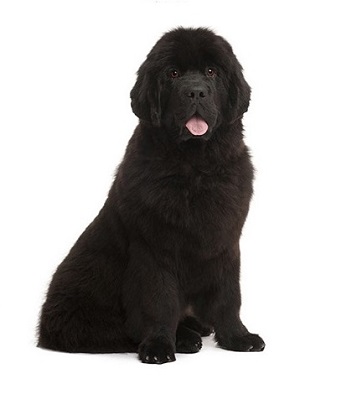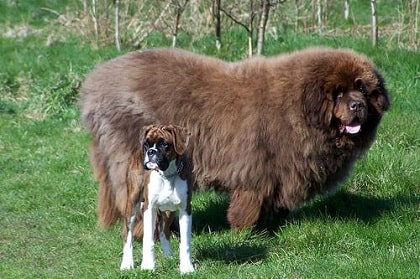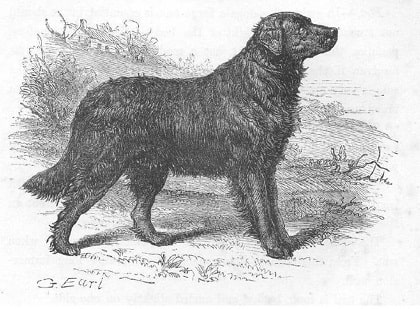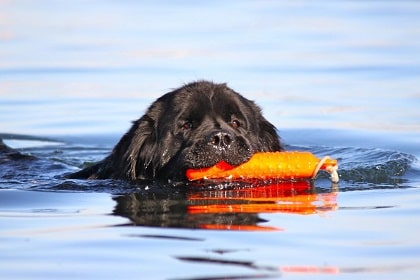Hailing from Newfoundland, this dog is remarkably big, strong and a hard worker. However, the Newfoundland Dogs also hold true to the phrase ‘gentle giants’. They are calm, loving and enjoy spending time with multiple people when trained properly.
This dog is trained to be a working dog, as its size and strength can be used in a variety of ways. They can be great at land, or in water, as they are excellent swimmers. In fact, swimming is an important activity for this lovely animal.
They have a sweet temperament and it makes them a wonderful addition to a family. Due to its size, Newfoundlands, also called Newfies, are not apartment dogs.
Newfoundland Dog Breed Overview

| Group: | Working Dog |
| Size: | Extra Large |
| Lifespan: | 8 to 11 Years |
| Best Suited For: | Active Families |
| Temperament: | Loving, Kind, Friendly, Obedient |
| Exercise Needs: | Moderate to High |
| Drooling Potential: | High |
| Grooming Needs: | High |
| Similar Breeds: | Komondor, Bernese Mountain Dog, Doberman Pinscher, Bullmastiff, Great Swiss Mountain Dogs |
1. Basic Features

The Newfoundland is quite famous for being sweet and affectionate to almost everyone they meet. They can be called Teddy Bears shaped like a dog, both because of their massive size and their kind nature. They are very cuddly and loves children, making them ideal for families with kids.
These dogs are large, standing at 28 inches tall, with a thick coat of fur that makes them look even bigger.
They are loyal, which means they can be trained with ease if started early. They are essentially ‘pack dogs’, meaning they enjoy the company of others in the family, and will not be happy if left alone for a long period of time.
Newfoundlands look quite intimidating because of their size, but regular exercise and stimulation can help them to not jump or break things. They need regular maintenance as they have long, soft fur that needs trimming ever so often.
2. The Newfoundland Origin

The Newfoundland Dogs are of Canadian origin, where they were often seen with fishermen and their families. They are excellent swimmers and this was an ideal occupation for them.
Their origin stories are unclear, but we’ll try to break them down. The first and the most accepted theory is that they are a cross between the Tibetan Mastiff and the American Black Wolf, a species that is extinct.
Another theory is that the Vikings were responsible for the inbreeding of dogs, which created the Newfoundland.
The last theory is that this animal was the result of several years inbreeding throughout the entirety of the 15th and the 16th century, which also saw the arrival of dogs such as the Mastiffs and the Portuguese Water Dogs.
3. The Personality of the Newfoundland Dog
If there was a word to describe this animal, it would be gentle. While puppies are energetic, when they are trained properly with lots of care, they grow up to be quiet and sweet.
They need sights, sounds and positive words to feel good, which means they cannot be left alone for longer periods of time.
They are protective over the younger and smaller members of the family because these dogs are protective in nature. This makes them a good dog for families with little children. All in all, they are happiest when included in all the family activities.
4. The Newfoundland Dog Behaviour
As a puppy, this dog breed is playful, loud, and energetic. They love cuddling, playing with toys and is often seen tagging their owners.
They also slobber a lot, which can cause matted fur down their chest easily if not taken care of. Luckily, they enjoy water activities, and it is not uncommon for adults to jump into the family pool and enjoy the water.
Canadian fishermen took these dogs when out to fish because they are active dogs who can sense danger and will not hesitate to jump in and save someone. This has given them the term, ‘nanny dogs’.
5. Exercise Requirements

While these dogs are quiet, they are also quite energetic. They love jumping, running, swimming and playing with the household members. They have a strong work ethic, which means that they are good rule observers and can follow instructions with ease.
These dogs need mental stimulation, so teaching them tricks is not only adorable for the owners, but it is also great for the dogs.
They need toys to play with, and they need them quite often because they do go through them quickly. As a result, these are perfect dogs for dog sports and shows.
6. Diet Needs
Because they are large dogs, they need adequate food. They usually need high-quality food, two times a day, consisting of 5-6 cups in each serving.
Their diet should be moderate protein and low fat.
Puppies need slow and steady growth, so it is important to keep an eye on them and their weight. What they eat also depends on their metabolism, so keep in touch with your vet and check in regularly. Teemed with regular exercise and this dog will thrive.
7. Trainability
Newfoundlands are very easy to train because they are obedient dogs. They are intelligent creatures that can understand commands easily. This is something that they carry in their genes, so with the right care, they learn quickly without a lot of resistance.
If not trained properly, these dogs can become very loud. But usually, this is not a problem as they can be easily trained.
8. Common Health Problems
While Newfoundlands, with the right care, are strong dogs, they are also prone to certain diseases. Diseases such as the Addison’s Disease is a serious condition that affects the dog’s adrenal gland and the signs of this disease should be taken care of immediately.
Cataracts and cherry eyes are also common diseases that afflict these species. They can be removed with the help of surgery, so it is important to visit the vet on a regular basis for general upkeep.
These dogs can also suffer from epilepsy that can cause mild to severe seizures. Seizures have varying symptoms, such as running around frantically, hiding, staggering. It can be frightening for owners, but your vet will offer help so you can help your dog manage it.
9. Who Should Adopt a Newfoundland
Being a family dog, this dog is suited for families and houses that have lots of space to run around. They are good for first-time owners and owners who don’t mind a playful puppy, or a playful adult, following them around.
Newfoundlands are lovable, gentle dogs who provide love and care forever one. They are big dogs with bigger hearts and is a perfect fit for loving families looking for a companion.
